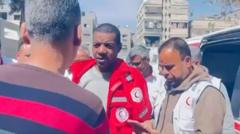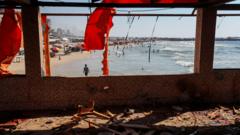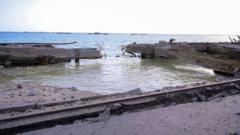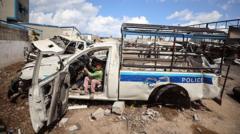Following the release of paramedic Assad al-Nassasra, detained during a deadly Israeli raid that resulted in the deaths of multiple emergency workers, the Israeli military's internal inquiry faces backlash. The Palestinian Red Crescent criticizes the findings, labeling them an attempt to distort the reality of civilian harm in the ongoing conflict, as violence escalates in the region amid humanitarian crises.
Release of Detained Gaza Medic Sparks Debate Amid Escalating Violence

Release of Detained Gaza Medic Sparks Debate Amid Escalating Violence
The Palestinian Red Crescent announces the release of paramedic Assad al-Nassasra after his detention during a deadly Israeli military operation, provoking heated discussions on accountability and humanitarian law in the ongoing conflict.
The Palestinian Red Crescent Society (PRCS) has confirmed the release of paramedic Assad al-Nassasra, who was detained by Israeli forces while responding to an emergency that resulted in the deaths of 15 first responders in southern Gaza last month. After 37 days in detention, al-Nassasra was welcomed by colleagues, following a period of uncertainty about his whereabouts, which lasted three weeks until the International Committee of the Red Cross intervened.
The release was part of a larger group of detainees freed at a border crossing, although the Israeli military has not issued a comment regarding the incident. During a recent internal inquiry briefing, Israeli officials acknowledged holding al-Nassasra but have been criticized for their report, which detailed "professional failures" leading up to the emergency workers' deaths, an assertion vehemently rejected by the PRCS.
The inquiry was prompted by an incident on March 23, when Israeli fire struck ambulances and emergency response vehicles in the Tal al-Sultan area of Rafah. Initially, the Israeli military claimed they targeted "suspicious vehicles" not using headlights, only to retract this statement upon discovery of video evidence showing the vehicles had their emergency lights activated at the time of the attack.
The inquiry's findings stated that miscommunication and operational misunderstandings led to the casualties. It found that the field commander, whose negligence contributed to the attack, was dismissed, though the PRCS denounces this inquiry as a superficial effort to mitigate accountability and reframes the issue as an indictment of Israel's treatment of humanitarian workers.
In the broader context, reports indicate continued violence in Gaza, with Israeli air strikes resulting in additional civilian casualties. The situation has reached a critical point, leading to dire humanitarian crises exacerbated by the blockade on aid shipments, with calls from UN officials urging for immediate action to prevent further deterioration.
International responses have been mixed; Israel defends its actions on the grounds of engaging in combat against terrorist factions, while humanitarian advocates emphasize the necessity of adhering to international laws protecting civilian lives. The PRCS's ongoing struggle highlights a profound divide in perspectives regarding accountability and ethical conduct in warfare, with implications for the future of humanitarian efforts in conflict zones.
With tensions remaining extraordinarily high and the death toll rising, the quest for accountability and basic human rights protections in Gaza continues to be a contentious battle on the world stage.


















